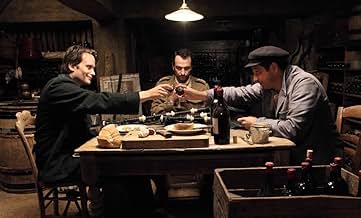IMDb रेटिंग
6.7/10
1.3 हज़ार
आपकी रेटिंग
अपनी भाषा में प्लॉट जोड़ेंA German communist flees to Northern France with his son. German troops follow May 1940. The son flees with the village towards Dieppe at the English Channel, as does the separated dad, join... सभी पढ़ेंA German communist flees to Northern France with his son. German troops follow May 1940. The son flees with the village towards Dieppe at the English Channel, as does the separated dad, joined by a Scottish officer.A German communist flees to Northern France with his son. German troops follow May 1940. The son flees with the village towards Dieppe at the English Channel, as does the separated dad, joined by a Scottish officer.
- पुरस्कार
- 2 कुल नामांकन
कहानी
क्या आपको पता है
- गूफ़The tanks depicted rolling on the wheat field are German Pz III Ausf D, which are correct to the date, but alongside with them are some StuG III Ausf G tank destroyers, which were not produced until late 1942, more than two years after the events of the invasion of France. Though could seem that two years are not relevant, the StuG III are at least three generations more advanced that the early tanks available in 1940 so this would be similar to show machine guns in the American Revolutionary War or modern F-117 or F-22 fighters in Vietnam War, as examples.
- साउंडट्रैकAmour du Mois de Mai
Music by Wal-Berg
Lyrics by Jacques Larue
Performed by Édith Piaf
(c) Sidem Editions
(p) 1948 Mercury Music Group
Avec l'autorisation de Universal Music Vision
फीचर्ड रिव्यू
"En mai, fais ce qu'il te plait" (2015 release from France; 114 min.; US title: "Come What May") brings the story of a group of villagers in northern France. As the movie opens, we are reminded, while watching archive footage, that 8 million people were displaced in May, 1940, one of the largest displacements in history. We then go to "One Year Earlier in Germany", where we get to know a man and his young son. It's not long before they are fleeing the country, only to turn up in France, pretending to be Belgians. The man gets arrested by the French when they find out his real nationality, leaving the son in the care of a school teacher. As we get to May, 1940, the village mayor tells everyone to evacuate, from Pas-de-Calais to Dieppe, some 100 miles to the southwest. At this point we're 10 min. into the movie, but to tell you more of the plot would spoil your viewing experience, you'll just have to see for your yourself how it all plays out.
Couple of comments: this is the latest movie from French director Christian Carion, best known for his Oscar-nominated WWI drama "Merry Christmas". Here he takes at a particular chapter in WWII, when millions of people from northern France tried to flee the invading Germans. Let me state upfront that I have no doubt it was a human tragedy. It's only that the movie doesn't come across that way until late into it. Indeed, much of the movie feels like a Sunday afternoon stroll in the countryside, with some wine and some dancing for good measure. It's not until the convoy gets attacked by German planes that it really feels like war is hell, and we feel some emotional connection to the characters. Indeed the last half hour of the movie is by far the best part of the movie. I wish that this level could've been achieved much earlier in the movie. There are some notable performances, including Alice Isaaz as the school teacher Suzanne, but real kudos to your young boy who plays 8 yr. old Max, and has speaking parts in both German and French (and impeccable in both languages). Last but certainly not least, there is a beautiful orchestral score by none other than the legendary Italian composer Ennio Morricone.
"Come What May" opened out of the blue at my local art-house theater here in Cincinnati this weekend, and I was eager to check it out. The Saturday matinée screening where I saw this at was attended okay but not great. If you have any interest in WWII movies, you may want to check it out, be it at the theater, or eventually on VOD or DVD/Bly-ray.
Couple of comments: this is the latest movie from French director Christian Carion, best known for his Oscar-nominated WWI drama "Merry Christmas". Here he takes at a particular chapter in WWII, when millions of people from northern France tried to flee the invading Germans. Let me state upfront that I have no doubt it was a human tragedy. It's only that the movie doesn't come across that way until late into it. Indeed, much of the movie feels like a Sunday afternoon stroll in the countryside, with some wine and some dancing for good measure. It's not until the convoy gets attacked by German planes that it really feels like war is hell, and we feel some emotional connection to the characters. Indeed the last half hour of the movie is by far the best part of the movie. I wish that this level could've been achieved much earlier in the movie. There are some notable performances, including Alice Isaaz as the school teacher Suzanne, but real kudos to your young boy who plays 8 yr. old Max, and has speaking parts in both German and French (and impeccable in both languages). Last but certainly not least, there is a beautiful orchestral score by none other than the legendary Italian composer Ennio Morricone.
"Come What May" opened out of the blue at my local art-house theater here in Cincinnati this weekend, and I was eager to check it out. The Saturday matinée screening where I saw this at was attended okay but not great. If you have any interest in WWII movies, you may want to check it out, be it at the theater, or eventually on VOD or DVD/Bly-ray.
- paul-allaer
- 23 सित॰ 2016
- परमालिंक
टॉप पसंद
रेटिंग देने के लिए साइन-इन करें और वैयक्तिकृत सुझावों के लिए वॉचलिस्ट करें
- How long is Come What May?Alexa द्वारा संचालित
विवरण
- रिलीज़ की तारीख़
- कंट्री ऑफ़ ओरिजिन
- आधिकारिक साइटें
- भाषाएं
- इस रूप में भी जाना जाता है
- Come What May
- फ़िल्माने की जगहें
- Grand Place, Arras, Pas-de-Calais, फ़्रांस(city bombing after the main character escapes the prison)
- उत्पादन कंपनियां
- IMDbPro पर और कंपनी क्रेडिट देखें
बॉक्स ऑफ़िस
- US और कनाडा में सकल
- $37,766
- US और कनाडा में पहले सप्ताह में कुल कमाई
- $9,738
- 11 सित॰ 2016
- दुनिया भर में सकल
- $13,09,818
- चलने की अवधि1 घंटा 54 मिनट
- रंग
- ध्वनि मिश्रण
- पक्ष अनुपात
- 2.35 : 1
इस पेज में योगदान दें
किसी बदलाव का सुझाव दें या अनुपलब्ध कॉन्टेंट जोड़ें


![Bande-annonce [OV] देखें](https://m.media-amazon.com/images/M/MV5BZmVjNGEwZjMtYWY0NC00NjJjLWJjOWItZjEzM2FiNDg4NTViXkEyXkFqcGdeQXRodW1ibmFpbC1pbml0aWFsaXplcg@@._V1_QL75_UX500_CR0)
















